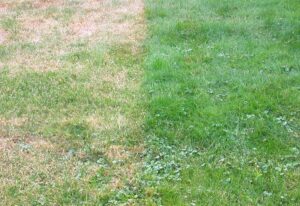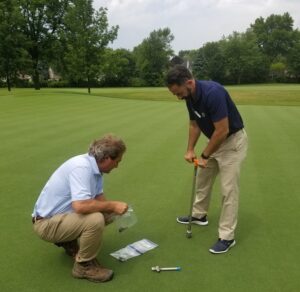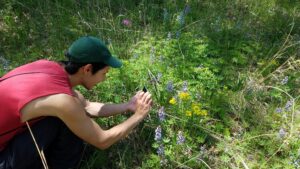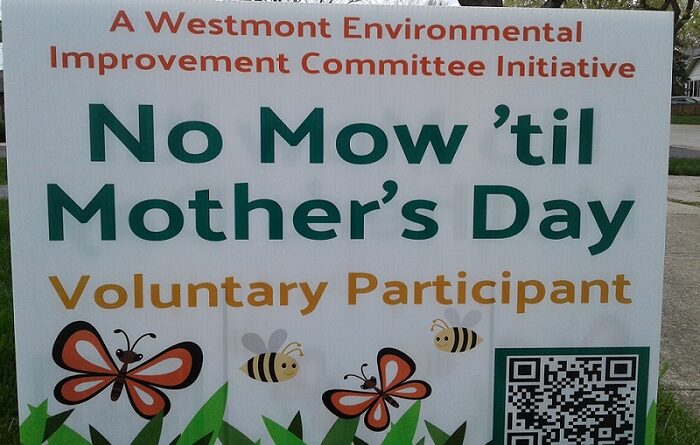Feel Good About Caring for Your Lawn
Podcast: Play in new window | Download (Duration: 2:00:51 — 57.4MB)
Subscribe: Apple Podcasts | Spotify | Android | iHeartRadio | Podchaser | Email | TuneIn | RSS | More
(April 25, 2021) Today’s first show segment is not about the Village of Westmont. But it is about lawn care. So I’m grateful to friend of the show Pat Skach, who took the above photo. It highlights a new lawn care program in that Chicago suburb. And it’s a great example of a new sensibility in lawn care. One that allows homeowners to feel good about caring for their lawns. One that is, indeed, changing the very paradigm of lawn care.
The program is called No Mow Until Mother’s Day. The Village website notes that it aligns with the Mayor’s Monarch Butterfly Pledge. The goal is to encourage residents to leave pollinator habitat undisturbed for at least a few weeks in spring to encourage biodiversity.
…could less rigorous lawn mowing make a difference to biodiversity in a suburban or urban setting? Given the cumulative area of lawns in urban and suburban areas in the U.S. and the millions of people that manage these systems, a recent research project explored the effects of mowing less frequently on floral resources, and in turn, what are the implications of relaxed management practices on bee and other pollinator populations. This 2-year study found that while mowing every 3 weeks resulted in as much as 2.5 times more lawn flowers and greater diversity of bee species, the abundance of bees was greatest when lawns were mowed every 2 weeks.
I wish the Westmont website had a link to the study to which it refers. However, I discovered other recent research that shows there are indeed benefits to easing back on mowing in urban areas.
The analysis showed that lawns that were more intensely mowed had lower plant and insect diversity. Although the researchers expected these results, they were surprised by the magnitude of insect loss and the strong influence of mowing intensity on weeds and pest animals. “It was also surprising and encouraging to find that often a small reduction in mowing frequency led to improvements in ecological variables,” says Watson

Which brings us to our first two guests. Both have been on the show before. Alec McClennan joined us just last September. He is the founder and owner of Good Nature Organic Lawn Care. At the time, the company had locations in Cleveland, Akron and Columbus, Ohio and in Indianapolis, Indiana. As of 2021, Good Nature has added a branch in Lombard, Illinois. Here’s how Good Nature describes “organic” lawn care.
Organic can have different definitions. For our purposes, organic means we use products that are feed-grade and nontoxic. Our organic products are safer for people, pets and the soil. Everything we offer fits that definition EXCEPT for a spot chemical weed control that is available by customer request. We do not use any 2,4-D (chemical weed killer), Imidacloprid (chemical insecticide), Neonicotinoids (chemical grub killer), or chemical fungicides. Instead, we use feed-grade materials like vegetable protein meals from alfalfa, corn, and soybeans, micronutrients and beneficial biological organisms that improve soil and make your lawn less friendly to weeds.
Joining McClennan today is another veteran of our program. Dan Dinelli, is a Certified Golf Course Superintendent (GCSAA) at North Shore Country Club in Glenview, Illinois. I’ve known Dan for a number of years and I love visiting him “behind the scenes” at the golf course, which is where he does his mad scientist experiments with turf, compost, and various soil amendments. He was recently the subject of a piece for the Chicago District Golf Association.
The article is titled North Shore CC Goes ‘‘Organic.’’ and it outlines his non-toxic approach to turf management, including examining the microbiome of turf. Here’s the part of the story that caught my attention.

Dinelli said golf course turf encounters its own set of microbes in the soil that impact its health much like the human gut. So, he reasoned, why not try to manage the plant’s microbiome to promote its health? Humans take antibiotics to fend off infections just as golf superintendents sometimes apply chemicals, such as fungicides and other pesticides. Both can disrupt the microbiome.
Dinelli has a variety of microbiome tools in his utility belt.
North Shore Country Club has 32 acres of creeping bentgrass fairways that are mowed to under a half inch, which causes stress.
But, Dinelli said, “I don’t fertilize my fairways anymore.”
Instead he nourishes the fairways with his own homemade blend of compost concocted from wood chips, biosolids, grass clippings, leaves and kitchen food scraps to feed worms making vermicompost.
That should make you feel good. Think about it. The Scott’s Company is out there telling people that they need to slam nitrogen fertilizer onto their lawns each spring, while the superintendent at a golf course that has played host to PGA events is saying that he doesn’t use that stuff anymore. At least not on his fairways. The world is changing.
If our tech goes well on Sunday, Dinelli will take us on a tour of his facilities at North Shore Country Club. (I have my fingers crossed.) I’m also eager to hear what he and McClennan have to say about spring lawn care in general.
Along that line, here are a couple of sites that you might want to visit if you want to feel good about looking for lawn care answers.
- Lawn Care: The Easiest Steps to an Attractive Environmental Asset – Cornell University
- When should I fertilize my lawn during spring? – Michigan State University
- A Guide to Growing Environmentally Friendly Lawns & Gardens – Midwest Grows Green
Chicago City Nature Challenge 2021
Here’s something else to feel good about. We’re less than a week away from the launch of the City Nature Challenge 2021. It started in 2016 as a competition between Los Angeles and San Francisco, but quickly bloomed into an international event.
Run by the Community Science teams at the California Academy of Sciences and the Natural History Museum of Los Angeles County, the CNC is an annual four-day global bioblitz at the end of April, where cities are in a collaboration-meets-friendly-competition to see not only what can be accomplished when we all work toward a common goal, but also which city can gather the most observations of nature, find the most species, and engage the most people in the event.
Don’t be concerned that it’s a cut throat battle between municipalities.
“It’s not really a competition, but a way to get people outside in their own neighborhoods and city parks to see what’s out there,” says Cassi Saari, project manager of natural areas for the Chicago Park District. Saari is managing this year’s City Nature Challenge in Chicago, which takes place from April 30 through May 3 in Cook, DuPage, Grundy, Lake, Kane, Kankakee, Kendall, McHenry and Will counties in Illinois; Newton and Porter counties in Indiana, and Kenosha and Jasper counties in Wisconsin.

It’s pretty simple, actually. The goal is to seek out wildlife in your city region, take a photo and share it on iNaturalist or your city’s chosen platform. You don’t have to be a scientist, and you don’t even have to belong to an organization. That said, there are several groups that are co-organizing Chicago’s participation in the event: Chicago Wilderness, Chicago Park District, Shedd Aquarium, and Chicago Botanic Garden.
The information is laid out clearly on this Chicago Wilderness page. The first thing is to go to iNaturalist.org or download the iNaturalist app (App Store and Google Play), which is required. From there,
- Create an account and join the project City Nature Challenge 2021: Chicago Metro. Your observations during the CNC will be automatically added to the project.
- Between April 30 and May 3, 2021, take photos of WILD plants, animals, fungi, and other creatures who call the Chicago region home.
a) That includes the organisms themselves, living or dead, or even evidence of them, such as scat, fur, tracks, and shells!
b) The boundaries of the competition include the following counties: Illinois: Cook, DuPage, Grundy, Kane, Kankakee, Kendall, Lake, McHenry, Will; Indiana: Jasper, Lake, Newton, Porter; Wisconsin: Kenosha.
c) All observations made during the CNC within the counties above are automatically added to the project. - Get feedback and identifications on your observations from actual scientists, experts, and other naturalists.
The results will be announced on May 10.
Joining us today to talk about the event is Taran Lichtenberger, M.S.. She is Budburst Community Engagement Manager at the Chicago Botanic Garden. While she’s here, we’ll see what’s going on with Budburst, which is a great project to get citizen scientists to make observations about plants that could ultimately help preserve many species on this planet.
North Shore Plant Club
I’m pretty sure that most gardeners feel good about saving money on plants. Earlier this year, Peggy and I received an email from a woman named Leslie Graham who said she was looking for folks “with a passion for plants.” She explained why.
We founded North Shore Plant Club three years ago, to create a way for people to get more plants, for much, much less money. We source plants from many of the Midwest’s premier nurseries, and through our website, offer them to people in the northern suburbs and Naperville area, for just a bit over wholesale pricing. We have saved club members thousands of dollars over the past few years, and added thousands of annuals, perennials and native plants to gardens, as well as shrubs and trees.
After starting on the North Shore of the Chicago metropolitan area, the club expanded to Naperville, and the plan is to add more locations in the future. As long as a delivery doesn’t require special equipment, they charge a $15 delivery fee. However, you also have the option to pick them up at their pop-up locations for no extra charge.
Among the plants they offer are annuals or perennials; small plants in flats or mature plants in big containers, Illinois Natives, current favorites, and new introductions. plants for solving problem areas, or “achieving goals.” They even offer deliveries of mulch, compost or soil.
Right now, the Plant Club will open on Sunday, April 25 with about 2000 annuals and perennials available. Orders will close Sunday, May 2 at 6pm. However, if you’re not ready right now, there are other sales scheduled for the rest of the year.
The club apparently operates on fairly thin margins, choosing, instead, to pass along the savings to its members. Graham says that any profits are used to “pay kids to unload the trucks, sort and sticker the plants,” to engage a few plant experts disseminate information about the plants, and to improve the website.
I would be remiss if I didn’t wonder how this operation will affect local Independent Garden Centers (IGCs). Or how the club maintains quality control. Or what kind of guarantees the club can offer its customers. I guess we’ll find out today when we have co-founders Leslie Graham and Chris Crone from the North Shore Garden Club on the show.

